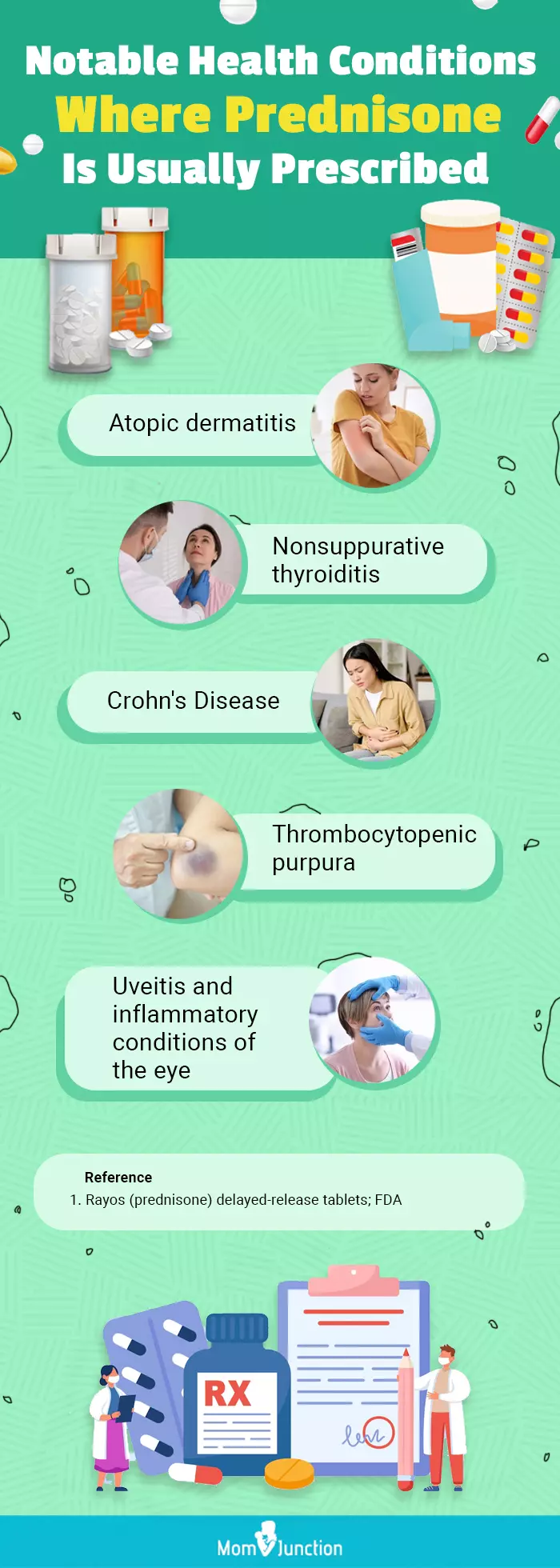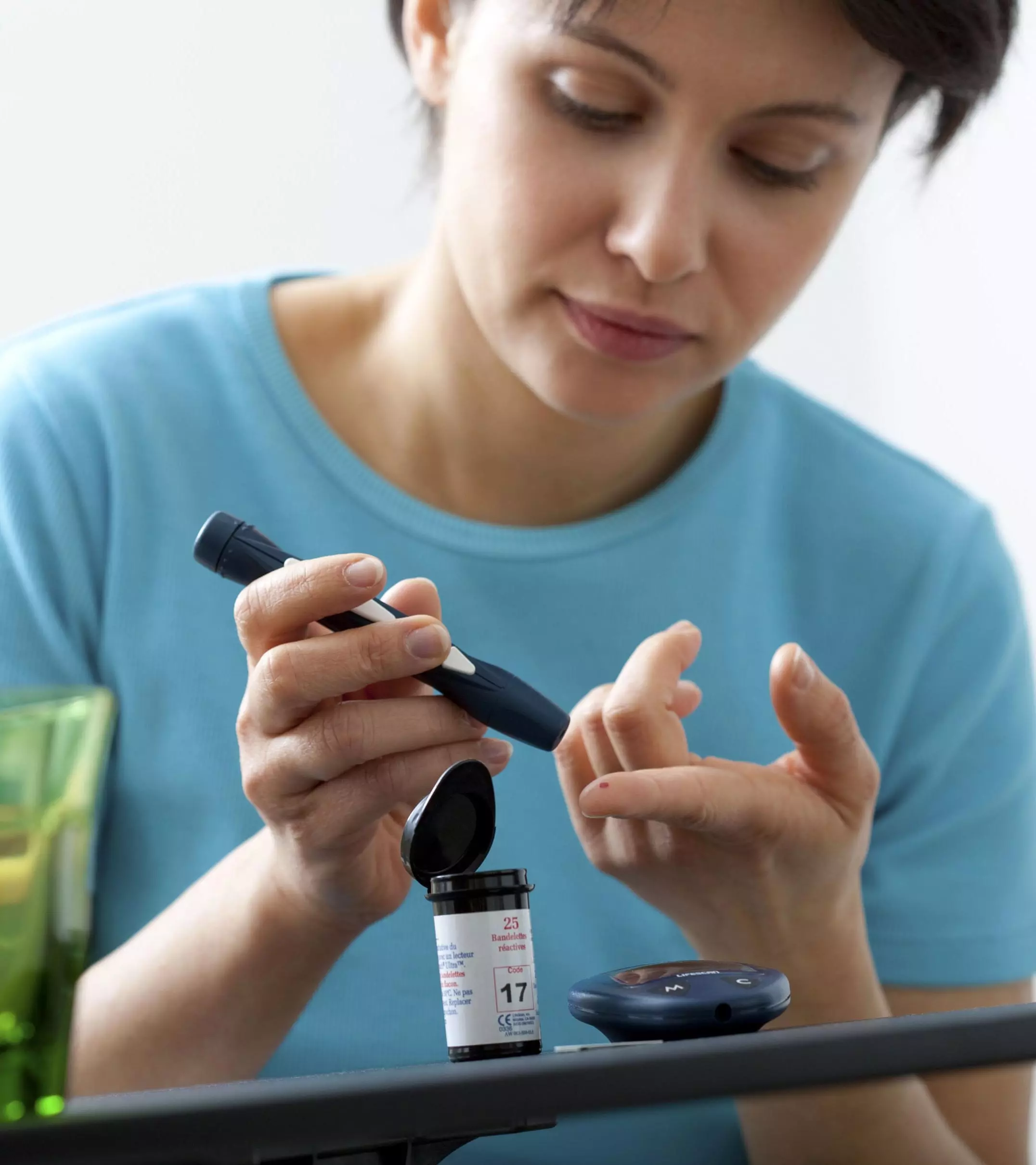
Image: Shutterstock
Prednisone is an immunosuppressantiDrugs that reduce and control the body’s immune response and prevent it from attacking its cells or tissues. drug used to treat various ailments. However, it’s uncertain whether you can take Prednisone while breastfeeding.
Usually, if you have a fever or upset stomach, you might wait for these conditions to resolve on their own because taking medications while breastfeeding is not recommended. However, if you have a painful immune system-related disease during lactation, you may wonder about the use of Prednisone.
The National Transplantation Pregnancy Registry in the United States investigated 124 nursing mothers with transplants for 48 months and found no evidence of Prednisone harming the newborn. Is this proof that Prednisone is safe to take during lactation? This post provides an answer to this query and discusses the drug’s effects on lactating mothers.
Key Pointers
- Prednisone is an immunosuppressant medication used to treat various conditions such as asthma, COPD, and rheumatoid diseases.
- Prednisone is generally safe in low doses for breastfeeding mothers according to the American Academy of Pediatrics.
- The appropriate dose of prednisone while nursing should be determined by a doctor.
- Prednisolone, the active form of prednisone, can be found in breast milk.
- Prednisone may cause side effects such as weight gain, hair loss, and altered menstrual cycle in mothers.
- To reduce its risks, mothers should change breastfeeding frequency, drink ample water, avoid other chemicals, and follow doctor’s instructions.
What Is Prednisone?
Prednisone is a glucocorticoidiA class of steroid hormones responsible for essential body functions, involved in the treatment of inflammatory and autoimmune diseases. medication mostly used to suppress the immune system and decrease inflammation in autoimmune disorders and conditions such as allergies, asthma, COPDiChronic obstructive pulmonary disease, a lung disease that constricts the airway leading to coughing and suffocation. , eczema, and rheumatoid diseasesiRelated to conditions affecting the joints, bones, muscles, and ligaments, such as arthritis. . Doctors prescribe prednisone to treat low corticosteroidiA group of steroid hormones produced in the adrenal cortex that are used for treatments in synthetic form to reduce inflammation. levels and ensure optimum functioning of vital body processes.
Moms are usually apprehensive about taking corticosteroid while breastfeeding.
Is Prednisone Safe While Breastfeeding?
There is no scientific evidence to prove that prednisone is unsafe while breastfeeding. In fact, the American Academy of Pediatrics classifies prednisone as a drug usually compatible with breastfeeding.
If a nursing mother takes a small dose of prednisone, a negligible quantity of it enters breast milk. And this amount does not harm the baby or affect the mother’s milk production (1).
However, if the mother takes a high dose, then the higher drug content enters the breast milk. It would be at its peak in the mother’s milk at around one hour after its consumption. It is advisable to limit the drug dosage and avoid breastfeeding for four hours after taking medicine. Else, take the medication after nursing the baby for the last time in the day.
However, parents should monitor their baby’s growth, behavior, and any signs of adverse reactions closely. Regular check-ups with a pediatrician are essential to ensure the baby’s health and development are on track.
 Point to consider
Point to considerNote: Seek your doctor’s advice before taking any medicine while nursing.
What Is The Safe Dose Of Prednisone While Nursing?
A medical consultant is the right person to prescribe the safe dose of prednisone during the lactation period. He weighs the benefits against the potential risks associated with the drug to prescribe the specified dosage. An overdose or misuse of prednisone may lead to undesirable side-effects. It is crucial to regularly communicate with healthcare providers about any changes in symptoms or side effects experienced while taking prednisone to ensure the safest treatment plan is maintained.
The initial dosage of prednisone is around 5mg/day, and doctors gradually increase the dosage as per the requirement.
Prednisolone, the active metabolite of prednisone, is secreted in human milk. Various reports suggest that prednisolone concentrations in human milk are 5 to 25% of maternal serum level (2). The percentage of the drug entering the milk depends on several factors and some of them are:
- Maternal dosage
- Breastfeeding frequency
- Maternal metabolism
- Frequency of prednisone consumption
If your intake is around 40mg every day, the rate of secretion lies between 20 to 106ng/mL. The maternal prednisone dose of less than 20mg/day has no adverse effects while nursing (3).
Prednisone Implications While Nursing
So far, prednisone therapy has not been associated with any short-term or long-term complications in babies
. But the mother can develop side effects such as:
- Risk of developing hypertension
- Slow healing of wounds
- Weight gain

Image: IStock
- Increase in blood sugar levels
- Formation of nodular lesions or acne on the skin
- Osteopenia or osteoporosisiA condition that causes the weakening of bones due to decreased bone mass and mineral density.
- Hair loss

Image: IStock
- Abnormalities in menstrual cycles
Some other common side-effects of prednisone include dizziness, depression, acne, insomnia, stomach upset, and headache.
Medium to large doses of depot corticosteroids injected into the joints may lead to a temporary reduction of milk production.
Dr. Laila Kaikavoosi, a UK-based general practitioner and hormone specialist, says, “Prednisone, a corticosteroid, can potentially disrupt hormonal balance by interfering with the intricate hormonal interplay crucial for lactation. Therefore, women using prednisone while breastfeeding should monitor their milk supply closely under proper medical supervision.”
Researchers have found that the prednisone intake during the 28th to 34th week of gestation might interfere with the secretion of prolactin, thereby delaying the production of breast milk. However, no change was observed in the flow or volume of milk once the lactation begins.
Monitor your little one for signs such as infection, oral thrush, or viral diseases. If you observe any, seek immediate medical guidance and stop consuming the medicine.
Follow the dosage directions and safety warnings given by your physician. Also, take your measures to minimize the drug’s effect on the baby.
How To Minimize The Risk Associated With Prednisone?
Here are a few considerations that you can adopt to reduce the rate of secretion of prednisone in your breast milk:
- Change the breastfeeding frequency and avoid nursing the baby for at least three-four hours after taking prednisone. You may pump and store the breast milk before taking the medicine, and feed this during the gap. Additionally, consider using formula milk for your baby to prevent any potential issues.
- Drink adequate water to ensure optimal metabolite-excretion.

Image: Shutterstock
- Avoid the consumption of any other chemicals, synthetic compounds or drugs, as they may interfere with the ongoing medication.
- Prednisone may increase the risk of developing osteoporosis. Doctors recommend calcium and vitamin D supplements as they regulate the breast milk supply and protect you from the risk of developing osteoporosis.
- You may consider alternative drugs such as methylprednisolone and prednisolone during breastfeeding.
 Quick tip
Quick tipNote: Do not take any medicine without a doctor’s prescription.
Natural Ways To Boost Your Immune System While Breastfeeding
Following some simple tips may help boost the natural functioning of your immune system and overall maternal health.
- Get enough rest to eliminate excess stress.
- Avoid alcohol and illicit drugs.

Image: IStock
- Eat healthy food including fresh vegetables, fruits, whole grains, and nuts.
- Catch some sun rays for 10-15 minutes daily.

Image: Shutterstock
- Indulge in exercise regimes like yoga, walking, and Tai Chi.
 Did you know?
Did you know?Frequently Asked Questions
1. Will prednisone dry up the milk supply?
Research indicates that high doses of prednisone might occasionally suppress the milk supply (4). However, the mechanism involved in the process is still not unequivocally understood.
2. What are the side effects of prednisone in babies?
Maternal prednisone intake is known to have no adverse effects in breastfed infants, as a minuscule amount of the drug is transferred into the breast milk. Some experts may recommend waiting for four hours before breastfeeding after taking medicine. However, it may not be necessary in every case (4).
3. Does your body go back to normal after prednisone?
The time it takes to recover from prednisone withdrawal can range from one week to several months and is unique to each individual. Also, the recovery time is influenced by the underlying condition being treated, the duration of use and dose, and other medical considerations (5).
Prednisone is a steroid therapy medication that suppresses the immune system, reduces inflammation, and is commonly used to treat conditions like rheumatoid arthritis, asthma, etc. According to scientific research, taking prednisone while breastfeeding is safe because only a small dose of medicine passes into the milk, and it does not have any adverse effects on the baby. However, if the mother is taking a high dosage of the inflammatory medication, she should feed the baby before consuming prednisone or wait for four hours after consuming it. Also, consult a doctor for the right dosage suitable for your condition. Though the medicine has not shown any effect on the nursing bay, it may lead to weight gain, hair loss, or depression in mothers. Talk to your doctor about the side effects of prednisone, and take good care of yourself by eating healthy, staying hydrated, and resting enough.
Infographic: Conditions Where Prednisone May Be Implicated
Besides asthma, COPD, and rheumatoid diseases, there are several other conditions where you may be prescribed Prednisone. The conditions usually require the body’s immune responses to be suppressed to control their symptoms. The infographic below provides a list of some such health conditions. Illustration: Momjunction Design Team
Illustration: Is It Safe To Take Prednisone While Breastfeeding?

Image: Dall·E/MomJunction Design Team
References
- L Ost et al.; (1985); Prednisolone excretion in human milk.
https://pubmed.ncbi.nlm.nih.gov/3998938/ - RAYOS (prednisone) delayed-release tablets.
https://www.accessdata.fda.gov/drugsatfda_docs/label/2012/202020s000lbl.pdf - Lisa R Sammaritano and Bonnie L Bermas; (2014); Rheumatoid arthritis medications and lactation.
https://pubmed.ncbi.nlm.nih.gov/24614280/ - Drug Safety in Lactation.
https://www.medsafe.govt.nz/profs/puarticles/lactation.htm - 8 Prednisone Side Effects + How to Minimize Them.
https://health.clevelandclinic.org/8-prednisone-side-effects-how-to-minimize-them - op 10 superfoods for breastfeeding moms.
https://news.sanfordhealth.org/womens/top-10-breastfeeding-superfoods/
Community Experiences
Join the conversation and become a part of our nurturing community! Share your stories, experiences, and insights to connect with fellow parents.
Read full bio of Dr. Priya Shashank
- Dr. Laila Kaikavoosi graduated from King's College London Medical School in 1999. She completed her General Practice training in London and gained membership in the Royal College of General Practitioners in 2007. Dr. Kaikavoosi is a Diplomat of the Faculty of Reproductive and Sexual Health. She practiced and trained in teaching hospitals in the UK and USA.
 Dr. Laila Kaikavoosi graduated from King's College London Medical School in 1999. She completed her General Practice training in London and gained membership in the Royal College of General Practitioners in 2007. Dr. Kaikavoosi is a Diplomat of the Faculty of Reproductive and Sexual Health. She practiced and trained in teaching hospitals in the UK and USA.
Dr. Laila Kaikavoosi graduated from King's College London Medical School in 1999. She completed her General Practice training in London and gained membership in the Royal College of General Practitioners in 2007. Dr. Kaikavoosi is a Diplomat of the Faculty of Reproductive and Sexual Health. She practiced and trained in teaching hospitals in the UK and USA.
Read full bio of shreeja pillai
Read full bio of Rohit Garoo
Read full bio of Vidya Tadapatri



















